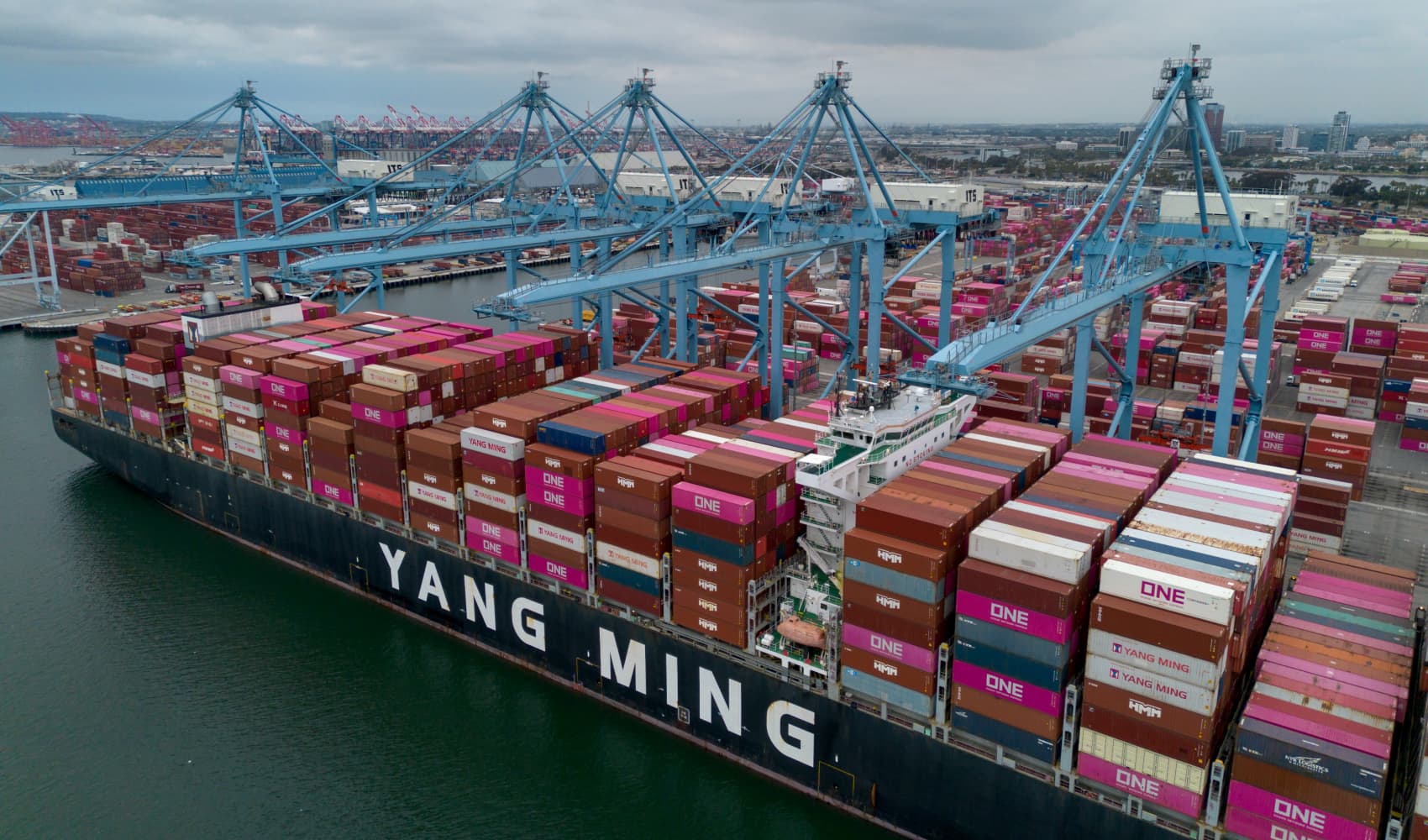South Korea Tariff Deal: Can Calm Win Before July 8?
South Korea Seeks Calm Amidst US Tariff Deadline: Can a Deal Be Struck?
Introduction: Navigating Trade Tensions with a Cool Head
The world of international trade can sometimes feel like a high-stakes poker game. Bluffs, calculated risks, and the constant threat of folding are all part of the equation. And right now, South Korea and the United States find themselves at the table, hoping to negotiate a deal that keeps both players in the game. South Korea has officially requested "calm" and "orderly" talks with the U.S. regarding ongoing trade issues, as the East Asian economic powerhouse aims to secure an agreement before the looming tariff deadline in early July.
The Clock is Ticking: The July 8th Deadline
So, what's the big rush? Well, July 8th is the date to keep an eye on. This is when U.S. President Donald Trump's 90-day tariff suspension is set to expire. Think of it as a ticking time bomb – if a deal isn't reached, tariffs could be reimposed, potentially disrupting trade flows and impacting both economies. No pressure, right?
South Korea's Strategy: Calm, Orderly, and Mutually Beneficial
South Korea's approach to these negotiations is, well, very South Korean: measured, strategic, and focused on finding common ground. Finance Minister Choi Sang-mok has emphasized the need for "mutually beneficial solutions", which sounds diplomatic, but it also means they're not willing to roll over. He also stressed the importance of communicating South Korea's concerns about the potential impact of tariffs. It's all about finding a win-win situation, or at least a situation where both sides can walk away feeling like they haven't lost too much.
The "2+2" Talks: A Deep Dive into the Issues
These aren't just casual coffee shop chats we're talking about. The negotiations are taking place within the framework of the "2+2" talks in Washington, D.C. These high-level discussions bring together key figures from both countries to tackle the complex web of trade issues. But what are the specific issues on the table?
Proposed Solutions: A Glimpse into South Korea's Playbook
South Korea isn’t just complaining; they’re coming to the table with concrete proposals. Trade, Industry and Energy Minister Ahn Dukgeun has outlined several potential solutions. These include:
- Contributing to the reconstruction of the U.S. shipbuilding industry: A potential olive branch, offering financial assistance to a struggling sector.
- Ensuring sustainable and balanced South Korea-U.S. trade: A commitment to fair trade practices that benefit both nations.
- Strengthening South Korea's energy security: Exploring avenues for cooperation in the energy sector.
U.S. Shipbuilding: A Key Area of Contention?
Why the focus on shipbuilding? Well, the U.S. shipbuilding industry has faced significant challenges in recent years, struggling to compete with lower-cost rivals. South Korea's willingness to contribute to its revival could be a crucial bargaining chip in these negotiations. It’s like saying, “We understand your concerns, and we’re willing to help.”
Sustainable Trade: More Than Just a Buzzword
The term "sustainable trade" gets thrown around a lot, but what does it actually mean in this context? It’s about ensuring that trade practices are fair, equitable, and environmentally responsible. It’s about creating a long-term partnership that benefits both countries without harming the planet or exploiting workers. This commitment is crucial for building a foundation of trust and cooperation.
Energy Security: A Shared Interest
Energy security is a top priority for both South Korea and the U.S. South Korea relies heavily on imported energy, making it vulnerable to price fluctuations and supply disruptions. By working together on energy projects, the two countries can enhance their resilience and ensure a stable energy supply. It's a win-win situation: South Korea gets a more secure energy future, and the U.S. gains a valuable partner in the energy sector.
The Impact of Tariffs: A Looming Threat
Let’s be honest: nobody likes tariffs. They drive up prices for consumers, disrupt supply chains for businesses, and create uncertainty in the global economy. The potential reimposition of tariffs on South Korean goods could have significant repercussions, impacting everything from automobiles to electronics. Avoiding tariffs is therefore a major priority for South Korea.
What's at Stake for South Korea?
What does South Korea stand to lose if a deal isn't reached? Besides the obvious economic impact of tariffs, there's also the potential damage to the broader U.S.-South Korea relationship. This relationship is not just about trade; it's also a strategic alliance that has been crucial for maintaining stability in the region for decades. A trade dispute could strain these ties, potentially undermining regional security.
What's at Stake for the U.S.?
The U.S. also has a lot to lose if the negotiations fail. South Korea is a major trading partner and a key ally in Asia. Damaging the trade relationship could hurt U.S. businesses and weaken the U.S.'s strategic position in the region. Furthermore, a trade war with South Korea could send a negative signal to other countries, potentially undermining the U.S.'s credibility as a reliable trading partner.
The Role of Geopolitics: Beyond Economics
It's important to remember that trade negotiations don't happen in a vacuum. Geopolitical factors also play a significant role. The U.S. and South Korea are close allies, facing shared challenges such as North Korea's nuclear ambitions. The trade talks are just one piece of a much larger puzzle. The need for strategic cooperation may provide additional incentive for both sides to reach a mutually agreeable outcome.
The Art of Negotiation: Finding Common Ground
Successful negotiations are all about finding common ground and identifying areas of mutual benefit. It requires compromise, creativity, and a willingness to understand the other side's perspective. Will South Korea and the U.S. be able to navigate these complexities and reach a deal by July 8th? Only time will tell.
Potential Outcomes: Best Case, Worst Case, and Somewhere In Between
What are the potential outcomes of these negotiations? In the best-case scenario, South Korea and the U.S. reach a comprehensive agreement that addresses all outstanding issues and avoids the reimposition of tariffs. In the worst-case scenario, the talks break down, tariffs are imposed, and trade relations deteriorate. More likely, the outcome will be somewhere in between, with some progress made but some issues remaining unresolved.
Looking Ahead: The Future of U.S.-South Korea Trade
Regardless of the outcome of these current negotiations, the U.S.-South Korea trade relationship is likely to remain a vital one for years to come. Both countries have a strong economic interest in maintaining close ties. The key is to find a way to manage trade tensions and build a more sustainable and balanced relationship for the future. This includes addressing concerns about fair trade practices, intellectual property rights, and market access.
Conclusion: Striking a Balance for a Stronger Future
The upcoming weeks are crucial for the future of U.S.-South Korea trade relations. South Korea's call for "calm, orderly" talks reflects its desire to avoid a trade war and find mutually beneficial solutions. The key issues on the table include tariffs, the reconstruction of the U.S. shipbuilding industry, sustainable trade practices, and energy security. The stakes are high for both countries, and the outcome of these negotiations will have a significant impact on the global economy. Whether they can meet the July 8th deadline remains to be seen, but a commitment to open communication and compromise will be essential for reaching a successful agreement.
Frequently Asked Questions
What is the significance of the July 8th deadline?
July 8th is when the U.S. President's 90-day tariff suspension is set to expire. If no deal is reached by then, tariffs could be reimposed on South Korean goods.
What are the main issues being discussed in the trade talks?
The main issues include potential tariffs, South Korea's contribution to the U.S. shipbuilding industry, sustainable trade practices, and energy security.
What does South Korea hope to achieve in these negotiations?
South Korea aims to avoid tariffs, secure mutually beneficial trade agreements, and strengthen its energy security, while fostering a stable economic relationship with the U.S.
What could be the impact of tariffs on consumers?
Tariffs generally lead to higher prices for consumers, as businesses pass on the cost of the tariffs to their customers.
Why is South Korea offering to contribute to the U.S. shipbuilding industry?
This is seen as a goodwill gesture and a potential bargaining chip to help alleviate U.S. concerns and encourage a favorable outcome in the trade negotiations. It shows South Korea's willingness to address specific U.S. industry challenges.




